I haven’t told you yet about my paternal grand-father, your great-great-grand-father.
He had been a barber before becoming destitute. By this I mean he tried to work a little bit at one point in his life, between episodes of absolute ethylic delirium.
My grand-father was famous in the village he came from. When I was a child, I would hear the women, while they had some tea on the balcony or prepared vegetables in a kitchen, repeat and repeat incredible stories about him.
It’s not that he drank non-stop for an entire week until collapsing that people found astonishing. It’s that he didn’t sober up after that. He would stay drunk day after day after day, too drunk to drink a single additional drop, passed out or hallucinating, unable to care for himself, shaken by tremors, scratching his skin to blood, screaming at imaginary perils. In his younger time, often up to 10 consecutive days would he stay delirious. He held the delirium tremens record in a region where men, when they weren’t in the woods logging trees for weeks in a row, were known for drinking their pay while wives and mothers despaired.
Whenever a charitable person brought my grand-father back, half unconscious, my grand-mother would lock him up in the basement and leave him there “in his own vomit, shit and piss” to quote relatives, without water, without food, disappointed a week later that he was still breathing, rambling on nonsense.
“He was a real force of nature” would say for a hundredth time an aunt or a neighbor.
I never heard them add that my grand-mother was cruel for treating her husband so harshly.
But then, it is true that she had owned a small hotel. My grand-father “drank” it, as they say, in a flash sending the business into bankruptcy. She had often tried to hide whatever money was in the cash register, the ladies would go on, but my grand-father would beat her up and get hold of the family's income.
I remember the hotel, the only one in those days servicing two or three villages, the clientele mainly made up of traveling salesmen. It had a big hall with lots of chairs and tables. Not much light, a dark place with too few lamps all in the shape of candles hanging from the ceiling. At the back, wide swinging wooden doors opening unto the kitchen, each with a round glass plate like the portholes on the side of a ship.
In there, on a counter, there’s a huge wedding cake. I see it. It’s white and pink with dashes of yellow. I can’t see the top of the cake, it’s too high, just it’s base. A marvelous frosting, so inviting, so available, with waves, curls, ridges, flowers and leaves. It’s so nicely done. I’ll just have a tiny bit, my finger poking at the creamy sides, a quick taste, the white, the pink, the yellow, a little bit everywhere so it won’t show, it will be the same all around.
I miscalculated, carried away by my greediness. I did in the end destroy the looks of that cake. At the last minute, they had to redo the frosting. But my grand-mother laughed good-heartedly at the incident.
So I knew for sure, when they talked about the mistreatments she had in place for my grand-father, that she couldn’t be an entirely mean person.
Years later, my grand-father’s health considerably declined. Only skin and bones, his back like a half-moon, never straight. He would walk, but so slowly. He slept in a separate room, away from my grand-mother. She stressed the fact so often to me. I think it had great meaning to her.
My grand-father by then had his own spoon, as well as a fork, a knife, a bowl, a plate and a glass all to himself, stashed away in a distinct cupboard. He wasn’t allowed to use any of the kitchen’s regular utensils or dishes. “Not to dirty them, irremediably” would whisper to my ear my grand-mother as I sat on her lap, both of us swinging in her rocking-chair, her shawl nicely wrapped around me.
My grand-father also had a bench on which he was allowed to sit always at the same spot, at the right end of the table. I wasn’t allowed to use that bench. It was only for him.
He would prepare his own food. Often, a tomato that he would carefully peel. And a boiled egg.
I was mesmerized by his gestures. An eternity it took. In silence, his head bent almost touching his plate, fine, long fingers slowly lifting the skin off the fruit piece by piece. Then, delicately he would slice the red flesh, minuscule lumps to make almost a puree. So much time invested in that tomato, it felt like a feast.
There were three things I was permitted to do with my grand-father: Fetch wood at sunrise for the stove, roll hand-made cigarettes with him, and go fishing in the afternoon, not far away, on the quay – old gray planks without a ramp next to the dock.
My grand-father would drag his feet down the hill leading to the sea as I slowed my pace to keep at his level, the fishing rods expertly leaning back against my shoulder.
We never caught a fish, but it felt good to stand in the fog, the loud rhythmic phonetics of the waves, the smell of wet salt everywhere. Only one color as far as the eye could see, a deep grayish tone transforming the world into a single, uniform place. Without alterations, not one blemish in that immense watery page. Nothing in the vast standardized expanse, except the depth and quality of the acoustic.
I think my grand-father liked it too. Perhaps, I venture, for the same reasons. Nobody but us fishing there in the cold.
He died a few months before my grand-mother. I was 14 by then. My dad received the call one evening that his father would not recover from pneumonia. I waited.
Not a single plan seemed to follow. So the next morning, I asked my father to pay for the train ticket, I would go.
It was not hard at all, baby, to help my grand-mother wash and feed my grand-father. She showed me how to, in a steady way, without flinching, doing everything in the right order, precise in her gestures, applied and focused, never giving up. She made it natural and easy, sitting at his bedside, watching over his needs.
But who would know? Not a single soul showed up at my grand-parents' place all the the time I was there.
Everybody likes to say how much they despised each other. I never believed it. They were too anchored in a shared set of manners. They may have had, it's true, a unique kind of relationship, mainly based on time and unifying routines, surpassing far and clear the transience of feelings.
On January first, a tradition: Kneeling in front of my grand-father to receive his blessing. I asked my grand-mother one day why the task fell upon a man so brittle, devitalized, hardly able to speak. I had wanted to say that she was much more competent and alert than he was. She replied, stretching her neck with pride, her face stern and decisive-looking: “Of course, because he is the patriarch of the family.”
Not long after my grand-father passed away, my grand-mother, who had never been sick, died in her rocking chair, as if falling asleep.
And I was happy for her. For that unadorned, effortless, limpid act of disappearance. "To go and join your grand-father," had she once mentioned to me, as if an item on a list, the same way one would simply state the most obvious thing to do.
I might be the only person alive not just remembering them, but idealizing them. Do not forget their names: She was called Elmire. He was called Amédée.
They mostly lived in a world with hardly any cars, and no TV. Strawberry jam had to be made at home, kept in jars sealed with wax. Yes, you've guessed it right. I used to pour the hot, whitish liquid wax, and wait for it to cool off before tightening the lid on dozens of jars. And I'm the one who would also cut the floury dough in all sorts of weird animal shapes before it was deep fried. I have a strange intuition that, back then, I had a name too.
That name has totally been forgotten. It's not the one written on my birth certificate. I feel it's a name that came before the name of Bruno, the boy who died at birth, my mother's first pregnancy. But I was told I replaced Bruno.
Do you see the baseball glove on the fridge, near the window with a milky green frame in my mother's kitchen in Montreal? It's meant for Bruno. Or am I confused?
There's a box on my grand-mother's table, a sort of time-warp effect, and hundreds of kilometers away, wrapped in colorful printed paper. It's for Bruno too. But he died. It's been explained to me. I will never see who he is. And that very tall man dressed in a dark suit walking away towards the door, - my grand-mother says he's my father - he won't give me the box. My grand-mother pats my head and tells me not to speak. I remember it because her voice was simultaneously so firm and calm, a reassuring imperative. I am at an age when, standing on the tip of my toes, I can barely see the surface of the table. It's such an endless, shiny table, with a gift on it, out of reach. I guess I'm mixed up.
Taking into account the nine months needed to have a baby, I don't understand how I can be witnessing this in Rimouski at an age approximately the same as the one I had when my sister was born in Cleveland. Something's wrong, sweetheart, with chronology, and with my sense of geography. And perhaps a bit more.
Laolao
He had been a barber before becoming destitute. By this I mean he tried to work a little bit at one point in his life, between episodes of absolute ethylic delirium.
My grand-father was famous in the village he came from. When I was a child, I would hear the women, while they had some tea on the balcony or prepared vegetables in a kitchen, repeat and repeat incredible stories about him.
It’s not that he drank non-stop for an entire week until collapsing that people found astonishing. It’s that he didn’t sober up after that. He would stay drunk day after day after day, too drunk to drink a single additional drop, passed out or hallucinating, unable to care for himself, shaken by tremors, scratching his skin to blood, screaming at imaginary perils. In his younger time, often up to 10 consecutive days would he stay delirious. He held the delirium tremens record in a region where men, when they weren’t in the woods logging trees for weeks in a row, were known for drinking their pay while wives and mothers despaired.
Whenever a charitable person brought my grand-father back, half unconscious, my grand-mother would lock him up in the basement and leave him there “in his own vomit, shit and piss” to quote relatives, without water, without food, disappointed a week later that he was still breathing, rambling on nonsense.
“He was a real force of nature” would say for a hundredth time an aunt or a neighbor.
I never heard them add that my grand-mother was cruel for treating her husband so harshly.
But then, it is true that she had owned a small hotel. My grand-father “drank” it, as they say, in a flash sending the business into bankruptcy. She had often tried to hide whatever money was in the cash register, the ladies would go on, but my grand-father would beat her up and get hold of the family's income.
I remember the hotel, the only one in those days servicing two or three villages, the clientele mainly made up of traveling salesmen. It had a big hall with lots of chairs and tables. Not much light, a dark place with too few lamps all in the shape of candles hanging from the ceiling. At the back, wide swinging wooden doors opening unto the kitchen, each with a round glass plate like the portholes on the side of a ship.
In there, on a counter, there’s a huge wedding cake. I see it. It’s white and pink with dashes of yellow. I can’t see the top of the cake, it’s too high, just it’s base. A marvelous frosting, so inviting, so available, with waves, curls, ridges, flowers and leaves. It’s so nicely done. I’ll just have a tiny bit, my finger poking at the creamy sides, a quick taste, the white, the pink, the yellow, a little bit everywhere so it won’t show, it will be the same all around.
I miscalculated, carried away by my greediness. I did in the end destroy the looks of that cake. At the last minute, they had to redo the frosting. But my grand-mother laughed good-heartedly at the incident.
So I knew for sure, when they talked about the mistreatments she had in place for my grand-father, that she couldn’t be an entirely mean person.
Years later, my grand-father’s health considerably declined. Only skin and bones, his back like a half-moon, never straight. He would walk, but so slowly. He slept in a separate room, away from my grand-mother. She stressed the fact so often to me. I think it had great meaning to her.
My grand-father by then had his own spoon, as well as a fork, a knife, a bowl, a plate and a glass all to himself, stashed away in a distinct cupboard. He wasn’t allowed to use any of the kitchen’s regular utensils or dishes. “Not to dirty them, irremediably” would whisper to my ear my grand-mother as I sat on her lap, both of us swinging in her rocking-chair, her shawl nicely wrapped around me.
My grand-father also had a bench on which he was allowed to sit always at the same spot, at the right end of the table. I wasn’t allowed to use that bench. It was only for him.
He would prepare his own food. Often, a tomato that he would carefully peel. And a boiled egg.
I was mesmerized by his gestures. An eternity it took. In silence, his head bent almost touching his plate, fine, long fingers slowly lifting the skin off the fruit piece by piece. Then, delicately he would slice the red flesh, minuscule lumps to make almost a puree. So much time invested in that tomato, it felt like a feast.
There were three things I was permitted to do with my grand-father: Fetch wood at sunrise for the stove, roll hand-made cigarettes with him, and go fishing in the afternoon, not far away, on the quay – old gray planks without a ramp next to the dock.
My grand-father would drag his feet down the hill leading to the sea as I slowed my pace to keep at his level, the fishing rods expertly leaning back against my shoulder.
We never caught a fish, but it felt good to stand in the fog, the loud rhythmic phonetics of the waves, the smell of wet salt everywhere. Only one color as far as the eye could see, a deep grayish tone transforming the world into a single, uniform place. Without alterations, not one blemish in that immense watery page. Nothing in the vast standardized expanse, except the depth and quality of the acoustic.
I think my grand-father liked it too. Perhaps, I venture, for the same reasons. Nobody but us fishing there in the cold.
He died a few months before my grand-mother. I was 14 by then. My dad received the call one evening that his father would not recover from pneumonia. I waited.
Not a single plan seemed to follow. So the next morning, I asked my father to pay for the train ticket, I would go.
It was not hard at all, baby, to help my grand-mother wash and feed my grand-father. She showed me how to, in a steady way, without flinching, doing everything in the right order, precise in her gestures, applied and focused, never giving up. She made it natural and easy, sitting at his bedside, watching over his needs.
But who would know? Not a single soul showed up at my grand-parents' place all the the time I was there.
Everybody likes to say how much they despised each other. I never believed it. They were too anchored in a shared set of manners. They may have had, it's true, a unique kind of relationship, mainly based on time and unifying routines, surpassing far and clear the transience of feelings.
On January first, a tradition: Kneeling in front of my grand-father to receive his blessing. I asked my grand-mother one day why the task fell upon a man so brittle, devitalized, hardly able to speak. I had wanted to say that she was much more competent and alert than he was. She replied, stretching her neck with pride, her face stern and decisive-looking: “Of course, because he is the patriarch of the family.”
Not long after my grand-father passed away, my grand-mother, who had never been sick, died in her rocking chair, as if falling asleep.
And I was happy for her. For that unadorned, effortless, limpid act of disappearance. "To go and join your grand-father," had she once mentioned to me, as if an item on a list, the same way one would simply state the most obvious thing to do.
I might be the only person alive not just remembering them, but idealizing them. Do not forget their names: She was called Elmire. He was called Amédée.
They mostly lived in a world with hardly any cars, and no TV. Strawberry jam had to be made at home, kept in jars sealed with wax. Yes, you've guessed it right. I used to pour the hot, whitish liquid wax, and wait for it to cool off before tightening the lid on dozens of jars. And I'm the one who would also cut the floury dough in all sorts of weird animal shapes before it was deep fried. I have a strange intuition that, back then, I had a name too.
That name has totally been forgotten. It's not the one written on my birth certificate. I feel it's a name that came before the name of Bruno, the boy who died at birth, my mother's first pregnancy. But I was told I replaced Bruno.
Do you see the baseball glove on the fridge, near the window with a milky green frame in my mother's kitchen in Montreal? It's meant for Bruno. Or am I confused?
There's a box on my grand-mother's table, a sort of time-warp effect, and hundreds of kilometers away, wrapped in colorful printed paper. It's for Bruno too. But he died. It's been explained to me. I will never see who he is. And that very tall man dressed in a dark suit walking away towards the door, - my grand-mother says he's my father - he won't give me the box. My grand-mother pats my head and tells me not to speak. I remember it because her voice was simultaneously so firm and calm, a reassuring imperative. I am at an age when, standing on the tip of my toes, I can barely see the surface of the table. It's such an endless, shiny table, with a gift on it, out of reach. I guess I'm mixed up.
Taking into account the nine months needed to have a baby, I don't understand how I can be witnessing this in Rimouski at an age approximately the same as the one I had when my sister was born in Cleveland. Something's wrong, sweetheart, with chronology, and with my sense of geography. And perhaps a bit more.




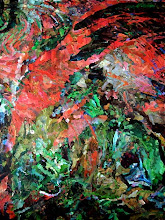
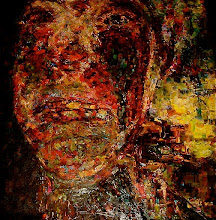
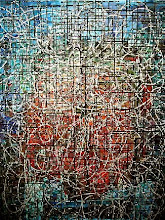
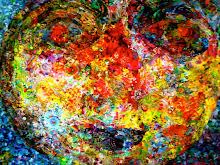
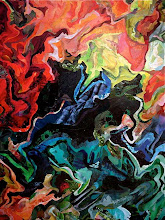
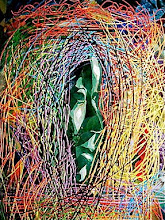
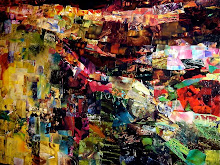

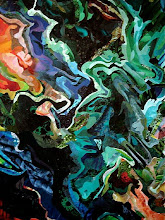
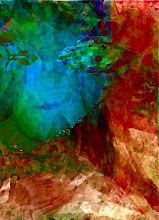.jpg)
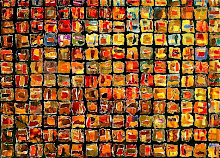
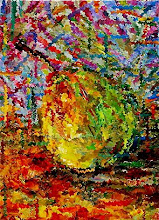
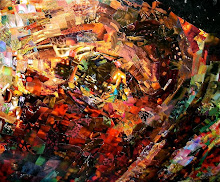
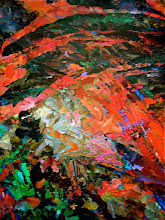
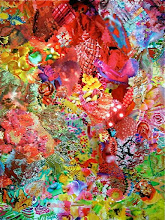
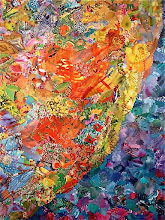
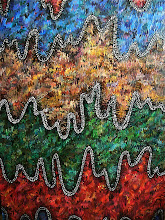
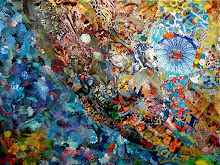
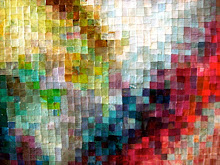
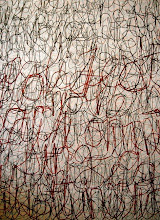
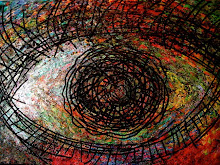
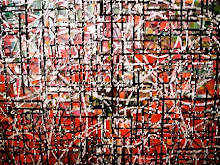

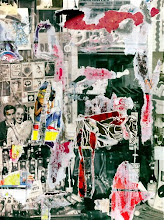
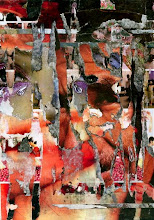
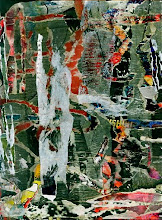
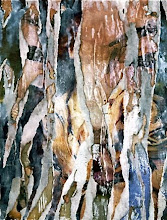


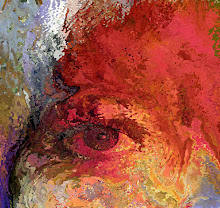
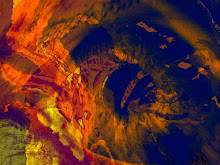
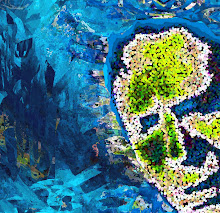
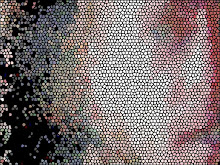.jpg)
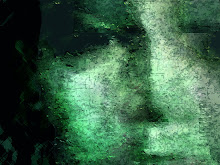
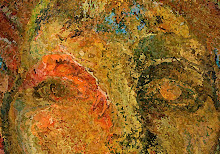
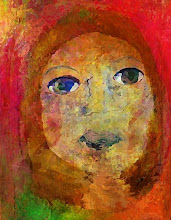.jpg)
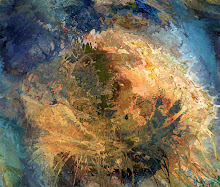
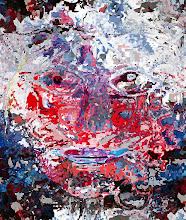
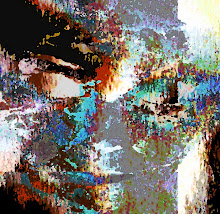
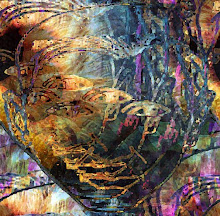


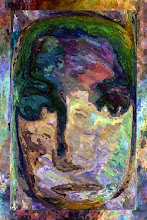photo+album).jpg)
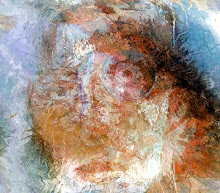.jpg)
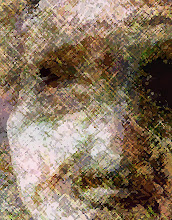
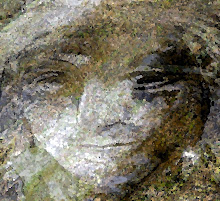

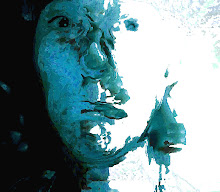
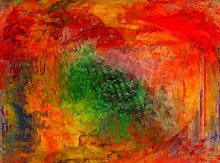





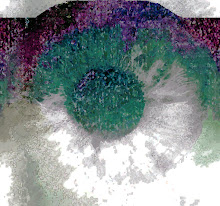
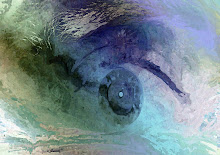

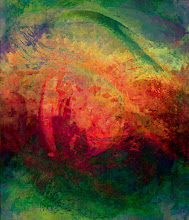

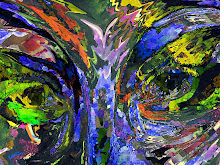
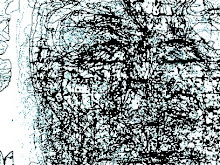.jpg)
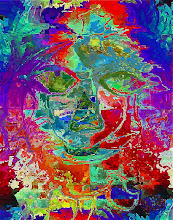

No comments:
Post a Comment